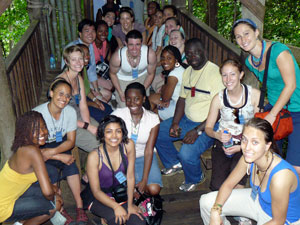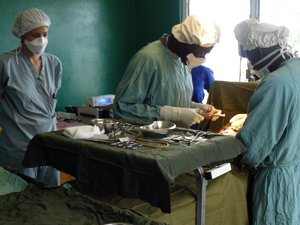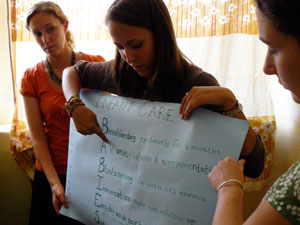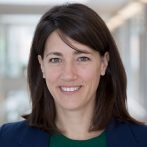 It’s not every day that a Women’s Studies major has the opportunity to help design medical equipment in West Africa, but thanks to assistant professor Kathleen Sienko (ME, BME) and the University’s Global Intercultural Experience for Undergraduates (GIEU), one such student did.Along with eleven others majoring in Engineering, African-American Studies, Nursing, Kinesiology, Neuroscience and Psychology.
It’s not every day that a Women’s Studies major has the opportunity to help design medical equipment in West Africa, but thanks to assistant professor Kathleen Sienko (ME, BME) and the University’s Global Intercultural Experience for Undergraduates (GIEU), one such student did.Along with eleven others majoring in Engineering, African-American Studies, Nursing, Kinesiology, Neuroscience and Psychology.
The interdisciplinary team, under Sienko’s leadership, was challenged with developing a maternal mortality prevention program in Ghana this past summer. “According to the World Health Organization, one maternal death occurs per minute, amounting to over 560,000 each year globally,” says Sienko. “And this number has not declined in the past twenty years despite gains in child health and family planning.”
The project was co-conceptualized by UM Department of Obstetrics & Gynecology (ObGyn) physician-scientist Dr. Frank Anderson. Ghanaian collaborators included Dr. Kwame Danso at the Okomfo Anokye Teaching Hospital (KATH) in Kumasi, Ghana, and Dr. Anthony Ofosu at the Sene District Hospital in Kwame Danso, Ghana.
UM ObGyn chair Dr. Timothy Johnson and ME’s Prof. Elijah Kannatey-Asibu, Jr. provided mentorship and local resources. Katharine Robb, a past GIEU participant, was the student fellow for the team, and Kofi Gyan was the Ghanaian field site logistics coordinator.
Global Intercultural Experience for Undergraduates (GIEU)
The GIEU Program at the University of Michigan provides opportunities for short-term faculty-led intercultural study emphasizing the development of intercultural skills, global perspective, cultural sensitivity, critical self-reflection, and navigation within an intercultural setting.
Undergraduates and faculty alike expand their learning beyond traditional classroom boundaries and gain a greater understanding of global situations and processes.
These intercultural endeavors are selected from proposals submitted by instructors at U-M’s Ann Arbor campus. Faculty interested in applying for the 2009 program must submit an application by October 1, 2008; student applications are due November 6, 2008.
The team–handpicked by Sienko from an applicant pool of more than 80 students–was directed to consider cultural barriers to healthcare, national and regional policy, education outreach, and innovative technological interventions in creating the program. Sienko’s team prepared for their trip to Ghana during the winter semester by performing a literature review of maternity healthcare best practices in the U.S. as well as global maternal mortality issues, attending lectures by Dr. Frank Anderson, an expert in the field, and by shadowing UM obstetrician/gynecologist clinicians and nurses in order to observe western medical practices first-hand.
For their field site experience at the Okomofo Anokye Teaching Hospital, the students observed clinicians and nurses in several wards including labor and delivery, mother-baby intensive care unit, and family planning. They traveled to the Sene District to observe rural health care practices. The students taught HIV education modules developed by UM’s Prof. Nesha Haniff and created maternal mortality prevention lesson plans that they presented to over 400 students at the Kumasi All Girls School.
Two concepts critical to the multidisciplinary team’s objective of identifying potential technological interventions to reduce maternal mortality were: keeping end-users such as the clinicians, nurses, and patients involved throughout the ideation phase and design process (known as co-creation); and providing opportunities that emphasize the engineering design thought process for non-engineering students.
 “I regularly emphasized the importance of contributions from the non-engineering students to the design of medical equipment,” says Sienko. “They were skeptical at first that they could make an impact within the technology arena but after two weeks of clinical observations they were contributing solutions.”
“I regularly emphasized the importance of contributions from the non-engineering students to the design of medical equipment,” says Sienko. “They were skeptical at first that they could make an impact within the technology arena but after two weeks of clinical observations they were contributing solutions.”
Now back in Ann Arbor, Sienko is working with Dr. Aileen Huang-Saad (BME) to implement an education program centered around global health design and social entrepreneurship that would include the development of a Global Health Design (GHD) minor in UM’s College of Engineering and the creation of a senior design course specializing in global health design. “The specialized section will challenge students to explore technical needs for current global health challenges and brainstorm new solutions with members of the global health medical community,” says Sienko, who will be piloting the design course during the winter 2009 semester within the existing ME450 Senior Design Course.
According to Sienko, the ideas generated during the GIEU Ghana experience will ideally lead to ongoing projects that promote a continuous presence in Ghana as well as other countries, and increase the potential for community-wide impact. There is the potential for future GHD students working in the same country to evaluate prototypes in the field and collect information that w
ould impact future design executions.
 “Immersion experiences such as this are a necessary component in teaching co-creational design,” says Sienko, “This new education plan will better prepare our engineering graduates for work in international health.”
“Immersion experiences such as this are a necessary component in teaching co-creational design,” says Sienko, “This new education plan will better prepare our engineering graduates for work in international health.”
